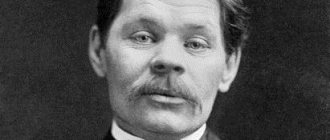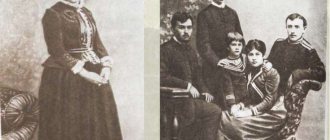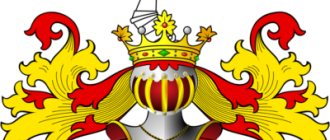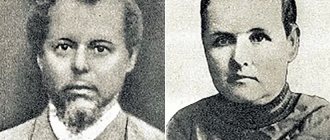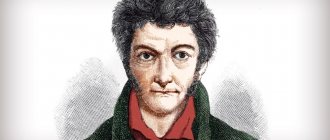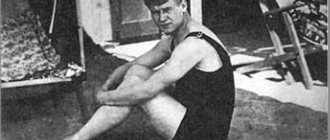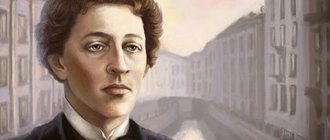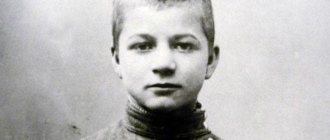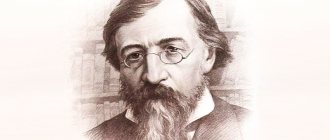A special place in literature, culture and journalism of the Soviet period belongs to Maxim Gorky. Chronological tables will help to better understand the evolution of the writer’s work, which had a powerful influence both on the development of proletarian prose and on socialist art and socio-political life of the early twentieth century. The talent of the singer of the new genre was recognized not only in the USSR, but throughout the world.
Childhood and youth
Maxim Gorky, whose real name was Alexey Peshkov, was born in Nizhny Novgorod on March 16, 1868 into a bourgeois family . The father died when the boy was three years old, and during the same period the child fell ill with cholera. He was treated by his grandfather, a demoted tsarist officer who had returned from exile in Siberia, where he served a sentence for cruel treatment of soldiers. While nursing Alyosha, he became infected and died. The future writer ended up in the family of Vasily Kashirin, his maternal grandfather, the owner of a dyeing workshop and a former deputy of the Nizhny Novgorod Duma.
The boy's childhood was difficult, since his grandfather's methods of education were very rough and inconsistent. In the story “Childhood,” M. Gorky then describes the years of difficult adolescence, filled with hard work and humiliation.
In the Kashirin family, Alyosha was taught to read and write and instilled a love for folk poetry, but further education was out of the question, since his grandfather gave the child “to the people” so that he could support himself independently.
When Alexey turned 15 years old, he entered the Sloboda school, but could not stay on course. A year later, he attempted to take the exams at Kazan University, but failed. From that time on, a period of wandering and vagrancy began in his life, which lasted until 1892, when, after an unsuccessful attempt to commit suicide, he wrote his first story, “Makar Chudra,” published in the newspaper “Caucasus.” The young man did not refuse any work, he was:
- assistant in a shoe store;
- a dishwasher on a Volga steamship;
- as an extra in a fair theater;
- workers in the Caspian fisheries;
- bakery assistant;
- revolutionary propagandist;
- watchman at the railway station.
The writer will say about this period of time: “The more difficult the living conditions were, the stronger and even smarter I felt.” Below is a chronological table with Gorky’s biography by dates until 1893 .
| Year | Event |
| March 16, 1868 | Birth in Nizhny Novgorod |
| 1876—1883 | Ilyinsky School. Completion of two classes |
| 1879 | Death of mother. Getting into the public eye |
| 1884 | Moving to Kazan. Failure in the exam at Kazan University |
| 1887 | Failed suicide attempt |
| 1888—1891 | Wandering around the Volga region, Bessarabia, Ukraine and the Caucasus |
| 1892 | Revolutionary populism. Work on the railway in Tiflis. The story "Makar Chudra". Return to Nizhny Novgorod |
Years of wandering
In the early 90s. Alexey Peshkov decided to see the world. It happened very simply - he came or arrived in some city, got a job at the first job he came across, and thus lived for several months. Then he changed the place. These were what he later called his universities - in the third part of his autobiography.
He moved mainly on foot. The chronological table of his movements is very large. Researchers of the writer’s work are still finding unknown archival data about his movements, although the writer himself described this period of his life in sufficient detail.
Rice. 3. Leo Tolstoy and Maxim Gorky. Yasnaya Polyana. 1900
First publications
In 1895, M. Gorky moved to Samara, where he truly began to study prose and immersed himself in creativity. Alexey Maksimovich published feuilletons and talented notes under the pseudonym Yehudi Chlamida. In the magazine “Russian Wealth”, with the assistance of the writer V.G. Korolenko, he managed to publish the story “Chelkash” about the smuggler Grishka. This work, which received a wide response from critics, opens the way to great literature.
By 1898, the aspiring writer published “Essays and Stories” in two volumes, and then presented readers with the novel “Foma Gordeev,” which made him overnight the most famous and fashionable prose writer among the working class and commoners. The theme of the decomposition and decay of the bourgeoisie, with a direct hint at the inevitability of a change in the political system, made the work extremely popular in the circles of the first wave of revolutionaries.
In April 1901, Gorky was under arrest and charged with sabotaging Narodnaya Volya propaganda directed against the existing order. Thanks to the intercession of L. N. Tolstoy, I. A. Bunin and A. P. Chekhov - authorities who saw Alexei Maksimovich as a great writer and appreciated his literary gift - the authorities had to give up and abandon their claims against the prose writer, releasing him under house arrest arrest.
In the same year he made his debut in drama, and Gorky brought great success to “The Bourgeois”. Then came the plays:
- "At the bottom";
- "Summer Residents";
- "Children of the Sun";
- "Barbarians".
They were included in the repertoire of the Moscow Art Theater and were enthusiastically received by the public and critics. Chronological table of Gorky's life and work in 1895-1905. will help you remember the main events in the life of a prose writer.
| Year | Event |
| 1895 | Moving to Samara. Stories “Chelkash”, “Old Woman Izergil”. “Song of the Falcon” - an allegorical hymn of the revolution |
| 1898—1899 | Meeting A.P. Chekhov in Crimea. Novels "Foma Gordeev" and "Three". Reader recognition. Joining Teleshov's circle. Meeting with L. N. Tolstoy in Moscow |
| 1901 | Arrest for revolutionary propaganda in St. Petersburg. Debut and success in drama. The play "The Bourgeois". “Song of the Petrel” - a prose poem, propaganda for the overthrow of the tsarist regime |
| 1902—1904 | Nizhny Novgorod. Work on plays, the most famous of which was “At the Depths” |
The beginning of Gorky's career
Gorky began writing prose in the early 90s. By that time he had already seen a lot. His first stories were romantic. If you follow the chronology, then first “Makar Chudra” appeared in 1892, the next was “Chelkash”, “Old Woman Izergil”, then “Song of the Falcon”. Some critics reproach the author that the language of these works is characterized by excessive solemnity. But this corresponded to the laws of the genre, as well as new trends that were already felt in Russian society. This was the time when Marx's teachings became very popular among both the intelligentsia and the workers. Populism was losing ground. Proletarians became the new heroes.
Rice.
4. Portrait of A. M. Gorky. Author M. Nesterov. 1901 Gorky felt this, so his works immediately began to enjoy success. In 1898 he published his first collection. Many writers started with poetry, but Gorky made his debut with prose and journalism. “Essays and Stories” caused a real sensation. His book was read in different circles. From that moment on, he was openly positioned as a purely proletarian writer
. But representatives of other movements also treated him with respect. At this time, his debut took place as an author of monumental prose - his first novel, “Three,” was published. In 1896, at the editorial office of one of the Samara magazines, he met Ekaterina Volzhina. Soon they got married. A year later Maxim was born, then Katya.
Revolutionary period
In 1905, the first political upheavals occurred in Russia. M. Gorky took part in the demonstration on January 9 (Bloody Sunday) and saw with his own eyes the execution of workers who tried to speak out in defense of their rights. This event greatly influenced the writer, who finally became convinced of the need for social change and the overthrow of the autocracy.
He joined the RSDLP and actively began donating money for the publication of Bolshevik newspapers, and also composed an appeal “To all Russian citizens and the public opinion of European states,” where he openly asked to fight tsarism.
For revolutionary agitation and plans, Alexei Maksimovich was arrested and imprisoned in the Peter and Paul Fortress, and a month later, under public pressure, he was released on bail. This time, not only representatives of the Russian cultural elite, but also progressive European circles that support the ideas of socialism came to his defense.
In the same year, he met V.I. Lenin, who played a key role in the subsequent life and work of the writer. 12 years later, after the February Revolution, which Gorky criticized in his own newspaper “Novaya Zhizn”, the head of the Bolshevik Party persuaded him to go into exile and engage in communist propaganda activities abroad, since the leader of the proletarians could not allow the loss of the “cultural icon” of the working class. The discord with the socialist movement and the change in attitude towards the revolution can be briefly characterized by the following statements of the writer:
- “Lenin, Trotsky and those accompanying them have already been poisoned by the rotten poison of power. Blind fanatics and unscrupulous adventurers are allegedly rushing along the path of social revolution.”
- “The right to dishonor is the easiest way to entice a Russian person to follow him, and so they coldly dishonor the revolution and the working class, forcing it to carry out bloody massacres.”
In 1918, Gorky founded the publishing house “World Literature” and began working actively there, while simultaneously trying to save the Russian intelligentsia from executions and terror. He spared no capital and effort for these humanistic goals. However, by 1921 he himself was under threat of arrest, so he decided to emigrate to Europe. After the death of V.I. Lenin, he began work on the detailed epic “The Life of Klim Samgin,” which became the pinnacle of his creativity and the comprehension of his writing path.
Interesting Facts
- At school, Gorky behaved extremely poorly and was considered a difficult student.
- The novel “Mother” was first published not in Russian, but in English.
- Gorky holds the record for the number of nominations for the Nobel Prize (5 times), but never received it.
- Gorky signed some of his works not with his name and patronymic, but simply with the initials AM.
- The city of which Gorky was a native bore his name for quite a long time.
- Gorky was published most often in the Soviet Union, his bibliography is enormous, and his autobiographical trilogy was the most popular work.
- Gorky is credited with saying that he would have been able to make the monarchy absolute if he had been the Russian Tsar. The question of who said this may appear in some crossword puzzle.
- Gorky collected Japanese bone figurines, many of which have survived to this day.
Previous
Biographies Shakespeare biography?, list of famous works, creativity, interesting facts, family, homeland, main ideas, what he became famous for
Next
BiographiesLeonardo da Vinci biography of inventions, creativity, paintings with titles, interesting facts from life, philosophy, main ideas and achievements
Return to Russia
The decision to return to the USSR became the final biographical page for the prose writer. The period from 1933 to influenza and death in 1936 was a time of extensive social work and a kind of culmination of the entire career of M. Gorky, who became the chairman of the new All-Union Congress of Soviet Writers.
At this stage, he worked only on the history of Klim Samgin and dealt with the problems of Soviet literature, met with popular European writers R. Rolland and G. Wales, as well as with the leaders of the USSR party elite Stalin and Molotov, who had to reckon with the opinion of this “cultural block” . Below is a table with a brief chronology of the main events of the biography of 1905-1936.
| Period in years | Fact |
| 1905 | Participation in the first Russian revolution. Arrest |
| 1906 | Emigration to America. Death of a daughter. Moving to Italy on the island. Capri |
| 1907 | Meeting V.I. Lenin in London and A.V. Lunacharsky. Novel "Mother" |
| 1909 | Organization of a party school in Capri. The stories “Summer” and “Okurov Town” |
| 1910 | Plays “Vassa Zheleznova” and “Weirdos” |
| 1911—1912 | Work in the editorial office of the Sovremennik magazine. The cycles “Tales of Italy”, “Across Rus'” and “Russian Tales” |
| 1913—1914 | Moving to Finland. The stories “Childhood”, “The Master” and “In People” |
| 1915—1916 | Founding of the Parus publishing house, work in Moscow and St. Petersburg, editing the Chronicle magazine. Receiving the title of honorary academician |
| 1917—1920 | Denial and criticism of the revolution. Founding of the newspaper “New Life” and the publishing house “World Literature”. Active correspondence with V.I. Lenin |
| 1921—1933 | Emigration to Europe. Life in Sorrento. Visit to the USSR. The novel “The Artamonov Case” and the beginning of work on the epic “The Life of Klim Samgin” |
| 1933—1935 | Return to Moscow. Death of son Maxim. Chairmanship of the All-Union Congress of Writers, active social work |
| June 18, 1936 | Death from pneumonia. Buried in Moscow near the Kremlin wall |
The writer left a rich literary heritage. Among the main works of M. Gorky one can note:
- Novels “Foma Gordeev”, “Mother”, “The Artamonov Case”, “The Life of Klim Samgin”.
- The stories “Childhood”, “Summer”, “Okurov Town”.
- Plays “Philistines”, “At the Depths”, “Vassa Zheleznova”, “Children of the Sun”, “Enemies”.
- Stories “Makar Chudra”, “Old Woman Izergil”, “Chelkash”.
- Prose poems “Song of the Falcon”, “Song of the Petrel”.
Maxim Gorky became one of the most significant figures in Soviet literature; he had to hone his skills during a turning point.
A brief chronological analysis of the prose writer’s writing career allows us to see the evolution and comprehend the fundamental problems of his work.
Gorky - journalist
Peshkov returned home in 1892. He appeared in one of the magazines and offered his services as an author. He liked the articles, he began working in several local newspapers at once, and even came up with a very original pseudonym. In those years he signed his materials as Yehudiel Chlamida
. Those who knew Hebrew and Greek more or less decently immediately formed associations with a cloak and a sword. But Alexey did not use this name for long. Soon he took a new pseudonym, under which he became first simply famous, and then a great writer. The first publication under the name “Maxim Gorky” was published in Tiflis.
Important! The pseudonym indicated exactly what the young author was going to write - only the truth, which may be bitter.
Chronological table of Pushkin Alexander Sergeevich
A chronological table of Gorky, his main life and creative events, will help schoolchildren and students visually study the biography of this great writer. Looking through Gorky's biography by date, it is easier to perceive all the titanic contributions that he conveyed to his country.
1868
- Birth of Alexei Peshkov, in the future - Maxim Gorky. The boy grew up in a poor middle-class family, whose father was engaged in carpentry.
1884
— Peshkov enters Kazan University, but fails.
1884
— He becomes close to radical youth. He studies the theory of Marxism and calls for the fight against autocracy.
1887
— Peshkov tries to shoot himself, but the suicide attempt fails. He recovers, but the shot lung will become a weak link in his body.
1888
— The future writer was taken under arrest for connections with Fedoseev’s organization.
Late 1880s – early 1890s
— Peshkov travels around Russia, he visited Ukraine, the Caucasus, and Crimea. This same period can be considered the beginning of literary activity. Peshkov publishes his first stories.
Since 1889
— He was arrested several times for revolutionary agitation.
1891
— The period of wanderings around Russia.
1892
— By this time, Peshkov had already changed many professions. He was a carpenter, a dyer, a baker, a loader, a barge hauler, a watchman, and a reporter.
1892
— Appearance of the story “Makar Chudra” in print. It was published by the Tiflis newspaper “Caucasus”. The aspiring writer signs this story with the pseudonym Maxim Gorky.
1894
- Publication of the story “Chelkash”.
1895
— Publication of the story “Old Woman Izergil”, poem “Song of the Falcon”.
